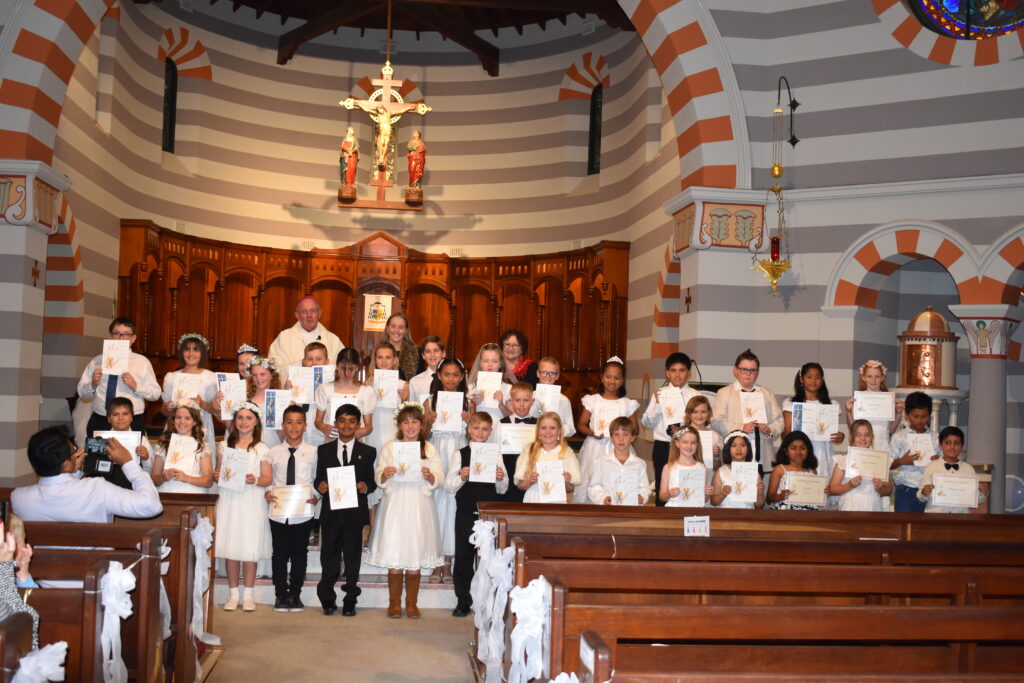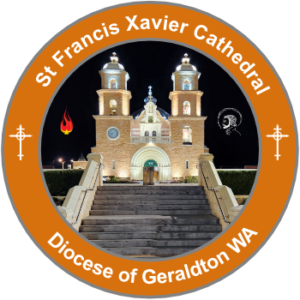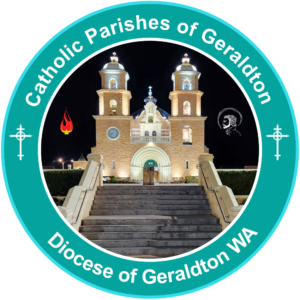Holy Eucharist / Holy Communion
What is the Holy Eucharist or Holy Communion
In Greek, the word, Eucharist means “thanksgiving” which is also the term used for the whole ritual of the Mass. People use the words Eucharist and Mass interchangeably. During the holy Mass, Catholic members of the community come forward to receive the body and blood of Christ, in the form of bread and wine. The Catholic Church teaches and the faithful believe that Jesus is truly, wholly, substantially present in the Eucharist.
From ancient times the Church has taught that the Eucharist is the source and summit of the Christian life. At every assembly in Jesus’ name which celebrates the memorial of his redeeming death and resurrection, the Church gathers to eat the bread of life and drink the cup of salvation.

Always be reverent before the Eucharist!
Children should be instructed by the parents that communion under both kinds is an ancient Church tradition for children receiving communion. If the eucharistic bread or any particle of it should fall, it is to be picked up reverently. If any of the precious blood spills, the area should be washed and the water poured into the sacrarium.
For the next First Eucharist Celebration
After School Lessons will commence on Wednesday 7th May 2025
Please Download
The Reception of the Eucharist
Through sacramental communion, the faithful take part more fully in the celebration of the Eucharist. The bread and wine for the eucharistic celebration should appear as food. The eucharistic bread should also be made in such a way that the priest is able to break the host into parts and to distribute them, to at least some of the faithful.
Holy communion is a more appropriate sign when it is received under both kinds. Christ is truly received whole and entire under either species. Reception under both kinds shows how the new and eternal, covenant is ratified in the blood of the Lord.
Click here to download the
The unity in Christ
The Church wants to ensure that the rite of communion in the Eucharist is celebrated with faith and dignity so that all participants may be united more closely through Christ in the community of the Church. It is because the Church wishes to emphasise this corporate unity in Christ, and therefore the symbolism of the one bread and the one cup, that the Church recommends that the priest and at least some of the faithful consume portions of the same host.
Because of its sign value, communion by drinking from the chalice is preferred to any other form of ministering the precious blood. The chalice is always offered to the communicant by the minister with the words: “The Blood of Christ” and the communicant answers “Amen”.
Please Download the Sacramental Commitment Form which has to be completed and taken to the Church at the Commitment Mass, along with a copy of the Baptism certificate.
Can non-Catholics receive Holy Communion?
People of all faiths are welcome to attend Mass in a Catholic Church. Non-Catholics are welcome to be present for the celebration, but only Catholics in a state of grace are able to receive Holy Communion during Mass.
Do I need to go to Reconciliation/Confession before I go to Communion?
The Sacrament of Reconciliation (also called Confession or Penance) is a part of Catholic faith and life. The core of this Sacrament is God’s love and mercy for us and his desire to heal us and set us free when we turn to him and seek his mercy.
Do I need to fast before receiving holy Communion?
It is recommended to take a fasting for at least one hour prior to receiving holy Communion. You can still drink water.
At what age can a Catholic receive communion?
At the age of 8 (whilst in the academical year 4 or above), a person can prepare to receive the holy Eucharist/Communion.
When does the First Eucharist celebration happen in the parish?
In the Second Term of the School year, usually in June, the First Eucharist / Communion celebrations take place in our parishes.
How can I receive the holy Eucharist/Communion for the first time?
Preparation classes for the first holy Communion are usually done in the Catholic primary schools when they are in year 4. If a child is not attending a Catholic School, or they are in older classes and have not received the First Eucharist, the parents can contact the parish. The parishes have After School Programs to prepare the children for receiving any sacraments. Please visit the web page for After School Sacramental Program on this site.
I am an adult and never received Communion. How can I receive it?
You need to do some preparations before start receiving Holy Communion. Please visit RCIA (Rite of Christian Initiation of Adults) page on this website for more information.


